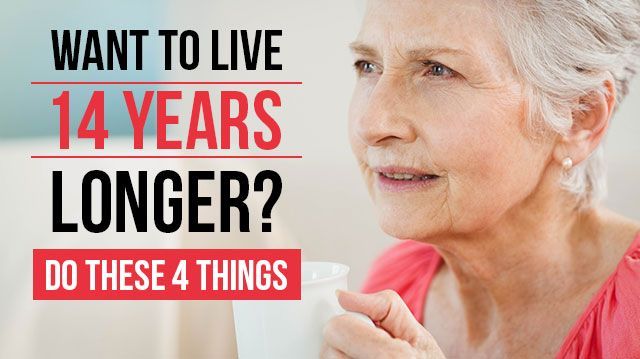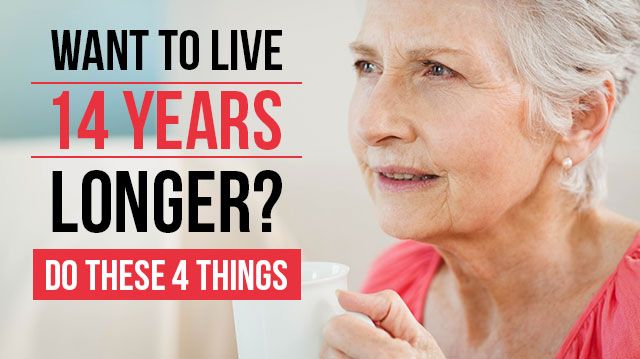
Did you know that the leading cause of death in the United States is due primarily to our diet and lifestyle choices? In fact, our genes only account for 10 to 20 percent of mortality risk. So instead of blaming our genes and focusing on what we can’t control, maybe we should focus instead on what we can control. By adhering to these four simple lifestyle factors, you can turn back your mortality clock 14 years.
Don’t smoke
By now, most people understand the link between smoking and lung cancer, and if you didn’t, here’s a fun fact: Tobacco smoke contains a deadly cocktail of over 7,000 chemicals, hundreds of which are harmful and 70 that can cause cancer.
Did you know that smoking may also lead to heart disease, stroke and chronic lung diseases? And it doesn’t stop there. Smoking also increases your risk for bladder, throat and mouth, kidney, cervix and pancreatic cancer. In addition, smoking, along with second-hand smoke, is linked to one-third of all deaths from coronary heart disease and about 90 percent lung cancer cases in the US, according to American Heart Association. If that doesn’t make you want to quit, think about this for a moment: On average, smokers die more than 10 years earlier than non-smokers.
Quitting smoking, according to Centers for Disease Control and Prevention (CDC), reduces your risk for early death, and:
- You’ll lower your risk for many types of cancer, notably lung cancer.
- You’ll reduce your risk of developing heart disease within one to two years upon quitting, and reduce your risk for a stroke and the narrowing of the blood vessels outside the heart.
- You’ll reduce your risk of developing respiratory symptoms, such as coughing, wheezing and shortness of breath. While symptoms may not disappear, they will not continue to progress either.
- You’ll reduce your risk of developing lung diseases such as chronic obstructive pulmonary disease.
- Women, of childbearing age, will reduce their risk of infertility.
- Women, who quit during pregnancy, will reduce the risk of having a low birth weight baby.
You are never too old to quit smoking. Although health benefits are greater for those who quit at earlier ages, all age groups benefit.
- Within 20 minutes of quitting, your heart rate and blood pressure will drop.
- Within 12 hours, the carbon monoxide level in your bloodstream will drop to normal.
- Within three months, your circulation and lung function will improve.
- After nine months, you’ll cough less and breathe easier.
- After one year, your risk of coronary heart disease will be cut in half.
- After five years, your risk of cancer of the mouth, throat, esophagus and bladder will be cut in half.
- After 10 years, you are 50 percent less likely to die from lung cancer, and your risk of larynx or pancreatic cancer decreases.
- After 15 years, your risk of coronary heart disease is the same as a non-smoker’s.
Seven out of 10 Americans want to stop smoking. If you’re one of them, talk to a medical professional for advice about quitting — and turn back your clock.
Lose weight
Let’s look as some hard facts concerning obesity: In 2014, more than 1.9 billion adults, 18 years and older were overweight — of these, over 600 million were obese. In 2013, 42 million children under the age of five were overweight or obese in 2013. And worldwide obesity has more than doubled since 1980.
Obesity, as defined by the World Health Organization (WHO), is abnormal or excessive fat accumulation that may impair health.
- A body mass index (BMI) greater than or equal to 25 is overweight.
- A BMI greater than or equal to 30 is obese.
Being overweight and obese places you at high risk for developing certain diseases such as diabetes, osteoarthritis, heart disease, stroke, and endometrial, breast and colon cancer. The higher your BMI, the higher the risk for developing these diseases.
Childhood obesity is linked to a higher chance of being obese as an adult, premature death and disability in adulthood. In addition, obese children experience breathing difficulties, risk of fractures, hypertension, insulin resistance and psychological effects.
Adapting a healthier lifestyle could greatly improve your risk of dying — no matter how old you are. Weight loss, even in adulthood, is worthwhile because it could yield long-term heart and vascular benefits, suggests a study reported in Science Daily. The study followed a large group of individuals over 60 years and allowed researchers to assess the effect of real-life changes in obese individuals.
Apparently, adults who drop one BMI category — from obese to overweight, or from overweight to normal — at any time during adult life, and even if they later regain the weight, can still experience reduced symptoms from cardiovascular-related diseases. However, improving diet and increasing physical activity is crucial for long-term weight management.
Better diet
The good news: You don’t need to make drastic changes to your diet to reap the positive benefits. Reduce your consumption of saturated fat and red meat, suggests Harvard Health, since it appears to increase the risk of colon and prostate cancers. Additionally, limit your intake of charbroiled foods (especially meat) and avoid deep-fried foods.
Eat more fruits, vegetables and whole grains, and include fish in your diet two to three times a week. Additionally, go easy on the sugar. Too much sugar in your diet is associated with heart disease, stroke, obesity, diabetes, high blood cholesterol and cancer. If want something sweet, avoid refined sugars and choose instead natural sweeteners like honey, maple syrup, agave or organic coconut sugar. Remember, calories do count; therefore, if you need to lose a little weight, take in fewer calories and get moving.
Half hour of exercise daily
 Everyone needs regular physical activity to improve overall health and fitness. However, you don’t need to compete in triathlons to get results. Thirty minutes of exercise daily is enough to dramatically improve your well-being and lower your risk of dying early. Exercising daily also lowers your risk of heart disease and diabetes, says the 2008 Physical Activity Guidelines for Americans. So what does this mean?
Everyone needs regular physical activity to improve overall health and fitness. However, you don’t need to compete in triathlons to get results. Thirty minutes of exercise daily is enough to dramatically improve your well-being and lower your risk of dying early. Exercising daily also lowers your risk of heart disease and diabetes, says the 2008 Physical Activity Guidelines for Americans. So what does this mean?
If you need to lose weight, then simply exercising 30 minutes a day and consuming a healthy diet could help, says Harvard Health. Even if you’re not currently active, 30 minutes a day can still go a long way to improve your health. That means a brisk walk for 30 minutes a day is really all you need. Alternatively, try a high-intensity spinning class one day, plus a half hour jog another day, or some other combinations of moderate and vigorous activity.
Statistics and health concerns aside, by changing your lifestyle you can dramatically improve your health and substantially reduce your risk of early death. The bottom line: Quit smoking, eat a healthier diet, get active and lose weight. Research suggests that those who manage one behavior lower their risk of dying by 40 percent, those who manage two behaviors reduce their risk by 50 percent, and those who manage all three behaviors reduce their risk of dying by 82 percent — that’s like turning back your mortality clock 14 years!
—Katherine Marko
Katherine Marko is a freelance writer, author and blog creator. Her areas of expertise include food, health, style, beauty, business and nutrition. Marko holds a Bachelor of Arts in English, a diploma in photography, graphic design and marketing, and certification in esthetics.
Sources:
http://www.ncbi.nlm.nih.gov/pubmed/11976443
http://www.heart.org/HEARTORG/HealthyLiving/QuitSmoking/QuittingSmoking/Smoking-Do-you-really-know-the-risks_UCM_322718_Article.jsp#.Vthvvn0rLs1
http://www.cdc.gov/tobacco/data_statistics/fact_sheets/cessation/quitting
http://smokefree.gov/rewards-of-quitting
http://www.who.int/mediacentre/factsheets/fs311/en
https://www.sciencedaily.com/releases/2014/05/140520184801.htm
http://www.ncbi.nlm.nih.gov/pubmed/19667296
http://www.health.harvard.edu/newsletter_article/The-10-commandments-of-cancer-prevention
http://www.ncbi.nlm.nih.gov/pubmed/22564893
http://www.hsph.harvard.edu/nutritionsource/2013/11/20/physical-activity-guidelines-how-much-exercise-do-you-need
http://health.gov/paguidelines/guidelines/chapter2.aspx

